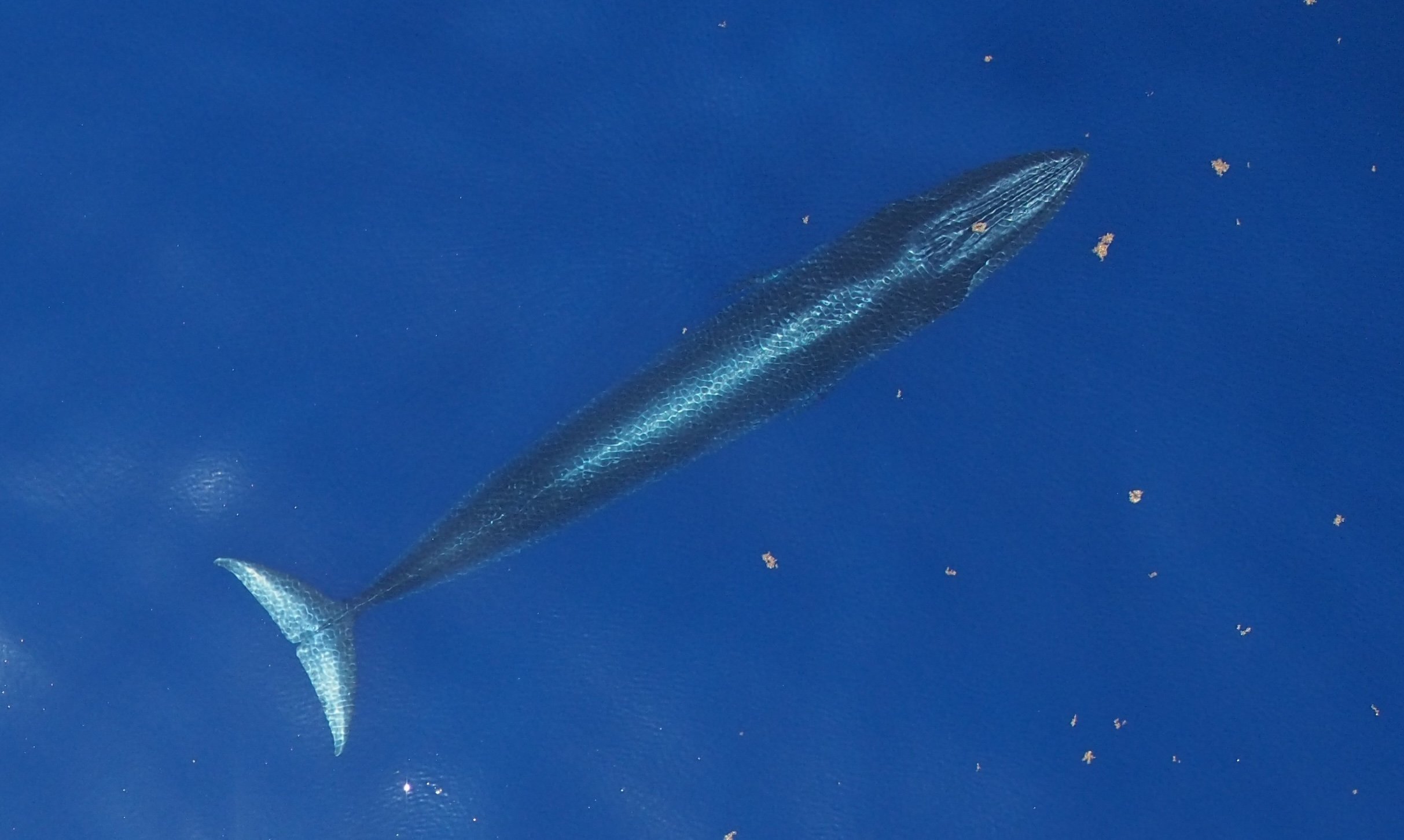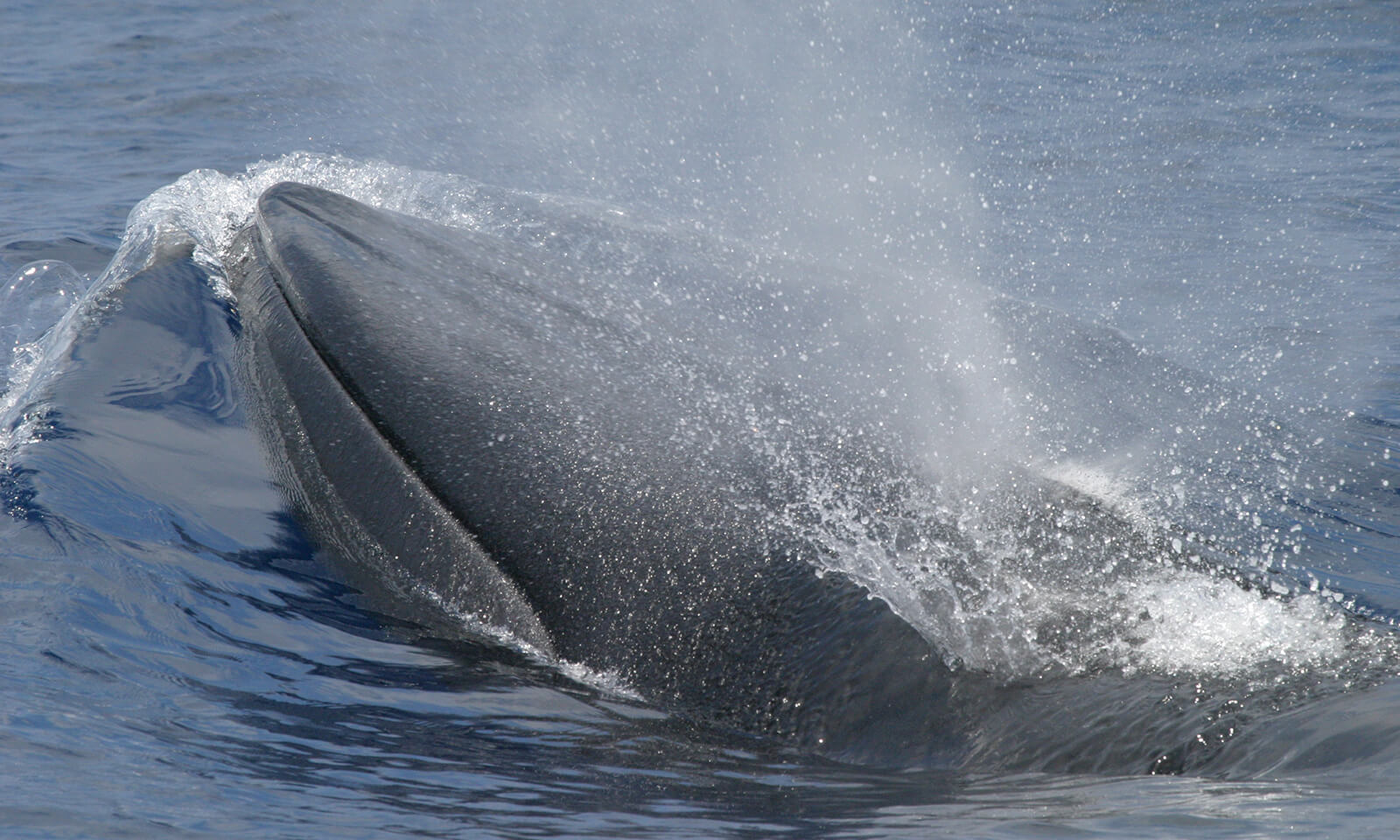
Header Image: Aerial view of a Rice's whale in the Gulf of Mexico. Image: NOAA/ NEFSC
One of the rarest whales in the Gulf of Mexico is in trouble. Oil spills, too much energy development, and vessel strikes are putting this whale’s future at major risk. This means they might not survive for much longer. We need to help them!

Meet one of the most mysterious whales in the United States...
Among the least known marine mammals found in the U.S. is the Rice’s whale, a baleen whale that prefers warm and tropical waters. Only recently discovered as a unique species, the Rice’s whale is exclusively found in the Gulf of Mexico where it frequents deeper water during the day and shallower water at night. Rice’s whales can grow to be over 40 feet long and are typically seen alone or in pairs. Little is known about their social and reproductive behavior, but they sometimes appear near the surface to feed in larger groups.
As the only known baleen whale in the world that resides in a warmer, tropical climate, they’re a fascinating species that we are still learning about. And they could be gone before we get a chance to discover more...
Critically endangered, the National Oceanic and Atmospheric Administration (NOAA) describes the current population as less than a hundred, while the Marine Mammal Commission estimates there are only 51 individuals remaining. Among the threats facing Rice’s whales are vessel strikes, marine debris, entanglement in fishing nets, seismic surveys and other oil and gas operations. As year-round residents of the Gulf of Mexico, the Rice’s whale lives in a region with considerable human activity, including ever expanding oil and gas development. With the population level so low, the recovery of the species depends upon the protection of each remaining whale.

Brydes whale coming up for air. Image: NOAA/SEFSC/MMPA
Oil spills and ever-expanding gas operations threaten Rice's breeding grounds.
To make matters worse, the whale’s habitat was damaged by a major oil spill in late 2023. On November 16, an offshore drilling pipeline spilled over a million gallons of oil 19 miles off the coast of southeast Louisiana. For an animal whose survival depends on a clean ocean environment, a massive spill of crude oil is a devastating scenario. Oil spills kill birds, fish, and marine mammals, while damaging beaches, coastal wetlands, fisheries, recreation and tourism. Along with many other terrible impacts, scientists estimate that the 2010 BP Deepwater Horizon oil spill caused the Rice’s whale population to drop by 22 percent. While the harm caused by the 2023 spill is not fully clear, the incident is just the latest reminder that oil spills are an inevitable part of offshore drilling and will continue to damage ocean ecosystems.
With the Rice’s whale in dire predicament, federal agencies have proposed actions to protect and recover the species. In July, 2023, NOAA announced plans to designate 28,000 square miles of critical habitat for the Rice's whale under the provisions of the Endangered Species Act. Such habitat designation would allow for regulations, such as a vessel speed limit, to help ensure the survival of the species.
Meanwhile, the Biden administration is delaying an oil and gas lease sale in the Gulf of Mexico until a federal court decides what protections can be included for an endangered whale. Unfortunately, these actions have been vociferously opposed by the oil and gas industry and their allies in Congress. As part of the backlash, the House Natural Resources Committee recently approved a bill that would slow down NOAA’s plan. Even worse, the House FY 24 budget bill proposal includes a harmful rider that would require two new oil and gas lease sales in the Gulf of Mexico every year.
The Surfrider Foundation is continuing our fight to protect ocean ecosystems and the amazing wildlife they support. As part of our Stop Offshore Drilling campaign, we are urging Congress to reject harmful amendments in the 2024 budget bill that would require new oil and gas lease sales in the Gulf of Mexico and Alaska. We are also fighting to pass federal legislation to permanently protect U.S. waters from new offshore drilling. Finally, we are supporting efforts by NOAA, Department of Interior and other agencies to protect the Rice’s whale from vessel traffic and oil and gas operations.
We must not allow this unique whale to go extinct! Join our campaign to Protect U.S. Waters from New Offshore Drilling. Just sign up below, and we'll send you an action alert directly to your inbox. Help protect endangered species, like the Rice’s Whale, from the harmful effects of expanding offshore oil and gas operations in the Gulf.
